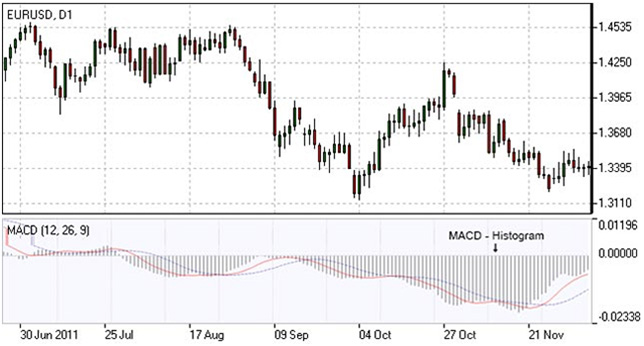- Education
- Forex Technical Analysis
- Technical Indicators
- Oscillators
- MACD Indicator
MACD Indicator - Moving-Average Convergence/Divergenc
What is MACD Indicator
How to use MACD Indicator in trading platform
How to Use MACD Indicator
Three main signals generated by the MACD indicator (blue line) are crossovers with the signal line (red line), with the x-axis and divergence patterns.
Crossovers with the signal line:
- If the MACD line is rising faster than the Signal line and crosses it from below, the signal is interpreted as bullish and suggests acceleration of price growth;
- If the MACD line is falling faster than the Signal line and crosses it from above, the signal is interpreted as bearish and suggests extension of price losses;
Crossovers with the x-axis:
- A bullish signal appears if the MACD line climbs above zero;
- A bearish signal presents if the MACD line falls below zero.
Convergence/Divergence:
- If the MACD line is trending in the same direction as the price, the pattern is known as convergence, which confirms the price move;
- If they move in opposite directions, the pattern is divergence. For example, if the price reaches a new high, but the indicator does not, this may be a sign of further weakness.

MACD Indicator
MACD Trading Strategy
MACD strategy is used to determine the buy and sell signals for the financial instrument. The MACD values range above and below the zero line. When the MACD and Signal lines are far above the zero line, this shows an overbought condition and indicates a sell signal. When the two lines are well below the zero line, this shows an oversold condition and indicates a buy signal.
In the MACD system, it is very important to consider MACD histogram. The histogram includes vertical bars which show the difference between two MACD lines. It is above the zero line when the MACD lines are in positive alignment, meaning that the faster line is above the slower line. And when the histogram is above the zero line, but starts to move down toward the zero line, this indicates that the uptrend is weakening. Accordingly, when the histogram is below the zero line and starts to rise toward the zero line, this shows a weakness in a downtrend.
Signals are shown on the zero line crossings. Though buy or sell signals are generated only when the histogram crosses the zero line, the latter provides earlier warnings of the trend than the crossover signals. The histogram turns toward the zero line always precede the actual crossover signals.
MACD Indicator Formula (MACD Calculation)
The MACD indicator formula is calculated by subtracting the 26-period exponential moving average from a 12-period moving average, and to eliminate random fluctuations, the obtained values are smoothed with a 9-period exponential moving average.
The MACD indicator formula is:
MACD line = 12-period EMA – 26-period EMA
Signal line = 9-period EMA
Histogram = MACD line – Signal line
Forex Indicators FAQ
What is a Forex Indicator?
Forex technical analysis indicators are regularly used by traders to predict price movements in the Foreign Exchange market and thus increase the likelihood of making money in the Forex market. Forex indicators actually take into account the price and volume of a particular trading instrument for further market forecasting.
What are the Best Technical Indicators?
Technical analysis, which is often included in various trading strategies, cannot be considered separately from technical indicators. Some indicators are rarely used, while others are almost irreplaceable for many traders. We highlighted 5 the most popular technical analysis indicators: Moving average (MA), Exponential moving average (EMA), Stochastic oscillator, Bollinger bands, Moving average convergence divergence (MACD).
How to Use Technical Indicators?
Trading strategies usually require multiple technical analysis indicators to increase forecast accuracy. Lagging technical indicators show past trends, while leading indicators predict upcoming moves. When selecting trading indicators, also consider different types of charting tools, such as volume, momentum, volatility and trend indicators.
Do Indicators Work in Forex?
There are 2 types of indicators: lagging and leading. Lagging indicators base on past movements and market reversals, and are more effective when markets are trending strongly. Leading indicators try to predict the price moves and reversals in the future, they are used commonly in range trading, and since they produce many false signals, they are not suitable for trend trading.

Not sure about your Forex skills level?
Take a Test and We Will Help You With The Rest


